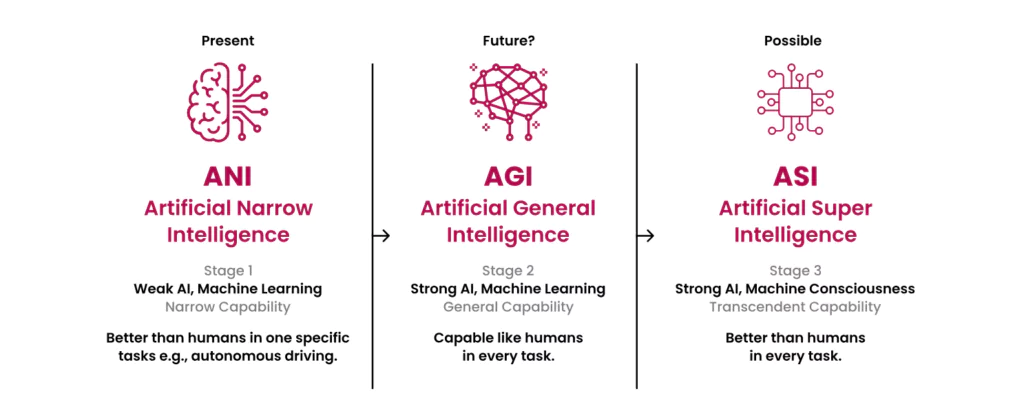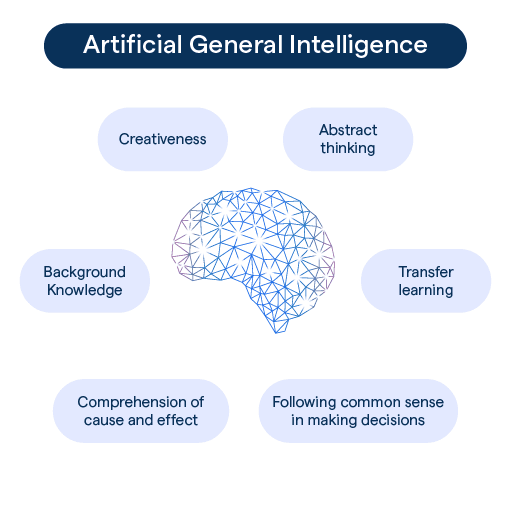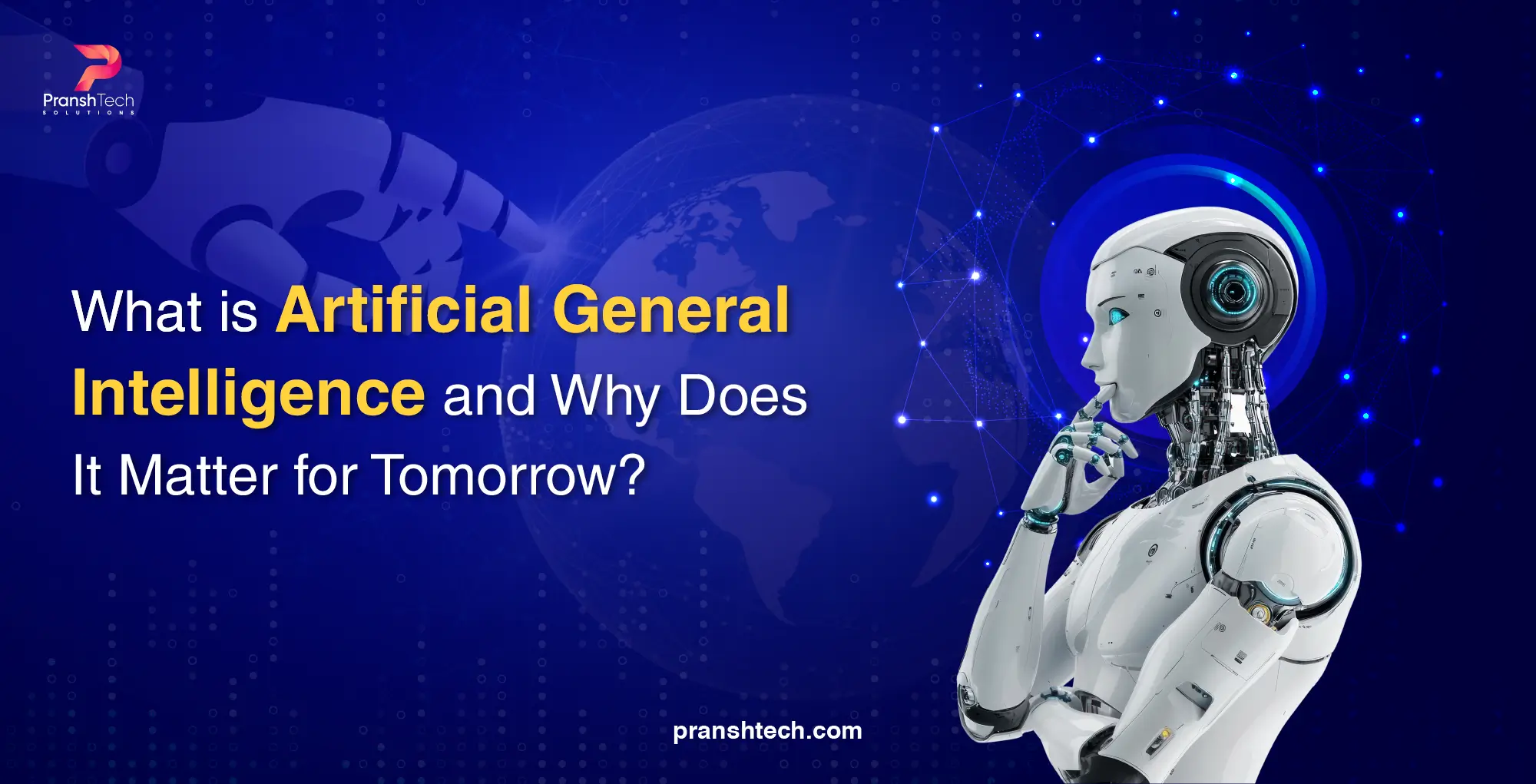Think of a computer that could play chess on a grandmaster’s level, compose a symphony, diagnose complicated medical conditions, and even design a self-sustaining city. Such is the promise of AGI. AI has advanced beyond belief, from chatbots answering our questions to algorithms predicting our shopping habits. However, it belongs to narrow AI, designed for specific tasks. AGI, conversely, aims to replicate human levels of all major types of intelligence. This isn’t just generically science fiction; it is a possible future that promises to change our world. Let’s see what AGI is and why it even matters.
What is Artificial General intelligence?
Artificial General Intelligence refers to a supposed machine with human-level mental abilities. It differs from Narrow AI, which excels in doing a particular thing; AGI is expected to comprehend, learn, and apply knowledge across a wide range of domains. Picture it as being a machine that is capable of reasoning and problem-solving, and capable of adjusting itself to new situations, just like a man. It’s not only about doing maths; it’s about understanding the system.
AGI vs. Narrow AI vs. Superintelligence

Image Source: Link
The domain of AI is vast; it includes everything from the less productive capabilities of narrow AI to the astonishing capabilities associated with superintelligence. Understanding the levels at which AGI fits into this spectrum is paramount. Lets compare all of the AI types:
| Feature | Narrow AI | Artificial General Intelligence (AGI) | Superintelligence |
| Definition | Task-specific AI works very well in one domain. | Human-level general intelligence. | AI extended to every area beyond human intelligence. |
| Capabilities | Works well in a restricted domain. | Perform any cognitive task that a normal
human being can do. |
Surpasses human abilities by far. |
| Examples | Voice assistants, recommendation systems, chess-playing AI. | Far superior problem-solving, decision-making, and creative abilities. | Hypothetical, highly speculative |
The Current State of AGI Research
While we have made tremendous advances into AI and ML Development Services, pure General Artificial Intelligence is still very theoretical. Some of the largest tech names-including OpenAI, DeepMind, and Google are doing groundbreaking research beyond limits. Nevertheless, several challenges remain in the way of AGI’s development:
-
Computational Power:
Reaching human-level intelligence would imply processing power far beyond what already exists on the market. Neurochips and quantum computing could prove to offer awaiting solutions, but they are both still in experimental stages.
-
Data & Learning Model:
In contrast to a human being, thereby lacking real-world experience, common sense reasoning, and emotional intelligence, AI simply currently does not involve huge datasets and machine learning models, transfers learning, adaptability in real time, and other unfamiliar scenarios.
-
Ethical & Safety Concerns:
The risks of an autonomous AGI system are a major debate among experts. Questions of control, bias, accountability, and alignment with human values must be answered before AGI can be deployed in a safe manner. Organizations like the Future of Life Institute and AI research ethics boards are working on governance models to ensure that sullenness is accounted for.
-
Energy Consumption:
Current AI models suck an enormous amount of power. The carbon price in training giant models is a growing concern amongst researchers; so are energy-saving alternatives like edge A.I. and federated learning.
What Are the Key Capabilities of AGI: How Can Machines Think Like Humans?

Image Source: Link
What, then, would AGI actually be? It would raise capabilities that imitate human cognition, breaking new ground from current narrow AI systems. In the following, we mention a few of the key abilities:
-
Reasoning and Problem-Solving:
AGI would be able to formulate solutions to complex problems, develop logical deductions, and solve unforeseen problems.
-
Learning and Adaptation:
AGI would learn new experiences, modify its operations, and hopefully check against the betterment of its performance.
-
Natural Language Understanding and Generation:
It would communicate effectively with humans, sometimes an ability that would include understanding nuances right through coherently and contextually relevant text.
-
Perception and Sensory Processing:
Interpreting and understanding sensory information drawn from the real world, similarly to how humans do.
-
Abstract Thought and Creativity:
Thinking outside the box, generating novel ideas, and solving problems in innovative ways.
Why AGI Matters for Tomorrow
With the capabilities mentioned, AGI would be able to conduct its own operations and make its own decisions based on complicated reasoning and variation in the surroundings. This function in the machine seems like a challenge that researchers are still trying to overcome.
AGI stands to establish that era of the Custom Software Development Company solution where machines think and act like humans. Key applications include but are not limited to:
1. Impact on Industries: A New Era of Innovation
The era of AGI will be marked by unprecedented advances in technology across various industries. From routine task automation to radical transformation in discovery, AGI will redefine the ways of doing business and how society benefits from innovation.
AGI could transform each sector:
-
Healthcare:
Personalized medicine, AI-driven drug discovery, and automated diagnostics could change patient care and medical research.
Imagine an AI doctor indulging continuously in deep learning from dozens of cases that would empower real-time suggestions to optimize treatment and eliminate human errors while improving survival
-
Education:
Adaptive learning systems and personalized tutoring and AI-based syllabus development could deliver educational materials and tutoring closer to the millions in need.
An online intelligent tutor which thoroughly analyses individual student styles of learning and disburses customized lessons will allow learning effectively for all.
-
Manufacturing:
Autonomous factories, predictive maintenance, and optimized supply chains could greatly enhance efficiency and cut operational costs.
Fully AGI-managed factories would self-maintain, optimize their production schedules, and withdraw human effort from dangerous work.
-
Transportation:
Full autonomy in vehicles, intelligent traffic management, and optimized logistics could mean safer, smoother movement of goods.
AGI transportation networks would prevent congestion by adjusting routes in reaction to dynamic real-time circumstances.
-
Scientific Research:
AGI could expedite discoveries of new materials, medicine, and technologies, driving human advancement ever-forward.
Factories run entirely by AGI-driven robots could self-repair, optimize production schedules, and eliminate human intervention in hazardous tasks.
-
Finance, Retail, and Cybersecurity:
AGI may transform the financial sector through improved fraud detection, strengthened investment strategy recommendations, and automation of some supercomplex transactions. Retail will feature advanced personalized shopping experiences, as well as intelligent inventory management. It could also play a significant role in predicting or preventing advanced live cyber threats in the cybersecurity space.
Consider AGI-powered fraud detection systems, which could identify suspicious transactions instantly and stub them before financial loss occurs.
-
Other Sectors:
From optimizing crop production and automating legal research to enhancing creativity in media and gaming, AGI can influence agriculture, legal service, and entertainment sectors tremendously.
2. Societal Implications: Opportunities and Challenges
Unlike their impact in the workplace, AGI shall also have significant impacts on the societal fabric:
-
Economic Changes:
It’s true some jobs will go away, but AGI may create new sectors and job openings, thus altering the composition of the workforce in ways that would otherwise remain unfathomable.
-
Ethics:
Issues such as AI bias, data privacy, and accountability will necessitate strong governance approaches to ensure the ethical development and deployment of AGI.
-
Global Challenges:
AGI may help with such major global problems as climate change, poverty, and disease; however, its introduction must be managed responsibly to avoid unintended impacts.
3. AI ML Development Services: Preparing for the Future
Organizations that want to remain ahead of the curve must begin their investments in AI ML Development Services now if they are to survive. The organizations, taking advantage of AI skills, could also introduce automation, support optimized decision-making, and create AI-driven intelligent software solutions as preparation in the quest for AGI. In developing AI, custom software development companies shall help enterprises adjust and become fruitful in the age of AGI.
Challenges and Considerations: Walking into the Future of General Artificial Intelligence
However, closing in on AGI is beset by its set of challenges and uncertainties to overcome:
Technical Barriers
- Understandable algorithms will need to be developed to supposedly replicate human-level intelligence.
- The building of computing and storage systems massive enough to arrive at AGI.
- Ensuring that AGI systems are safe and reliable enough to prevent unintended consequences.
Moral and Societal Dilemmas
- AI Alignment and Control, Aligning the AGI goals with human values and priorities.
- Potential Misuse, Preventing AGI from becoming an interlocutor in dreadful acts of misuse or jeopardizing any unintended kinds of harm.
- AI Consciousness and Rights, Sentient questions regarding the autonomy of AGI, its state of consciousness, and any potential legal status.
Although these problems are staggering in their enormity, it is only through a proactive approach that AGI development can be charted in an orderly and beneficial manner.
The Future of AGI: Whats Coming Next?
Motioning toward General Artificial Intelligence is not merely a technical enterprise but indeed a societal one. The future depends on responsible innovation, collaboration, and sound ethical frameworks to guarantee that AGI really benefits humanity.
Conclusion:
Artificial General Intelligence is a defining moment for the evolution of AI. While certain challenges remain, many benefits will ensue. If attention is directed at AGI from the perspective of its capacity and implication view, we are preparing for a future where intelligent machines are alongside humans to jointly solve world-developing options.
Pranshtech is among the foremost providers of AI & ML development services that empower businesses to embrace the power of AGI-driven solutions for innovation and growth. As a custom software development company, we create an AI strategy custom-tailored to you so that it can easily be integrated and leveraged for future needs. Whether you are incorporating an AI solution for the first time or extending your existing systems, contact us to discuss your requirements or schedule a demo free of charge.




 Dhaval Gajjar
Dhaval Gajjar 